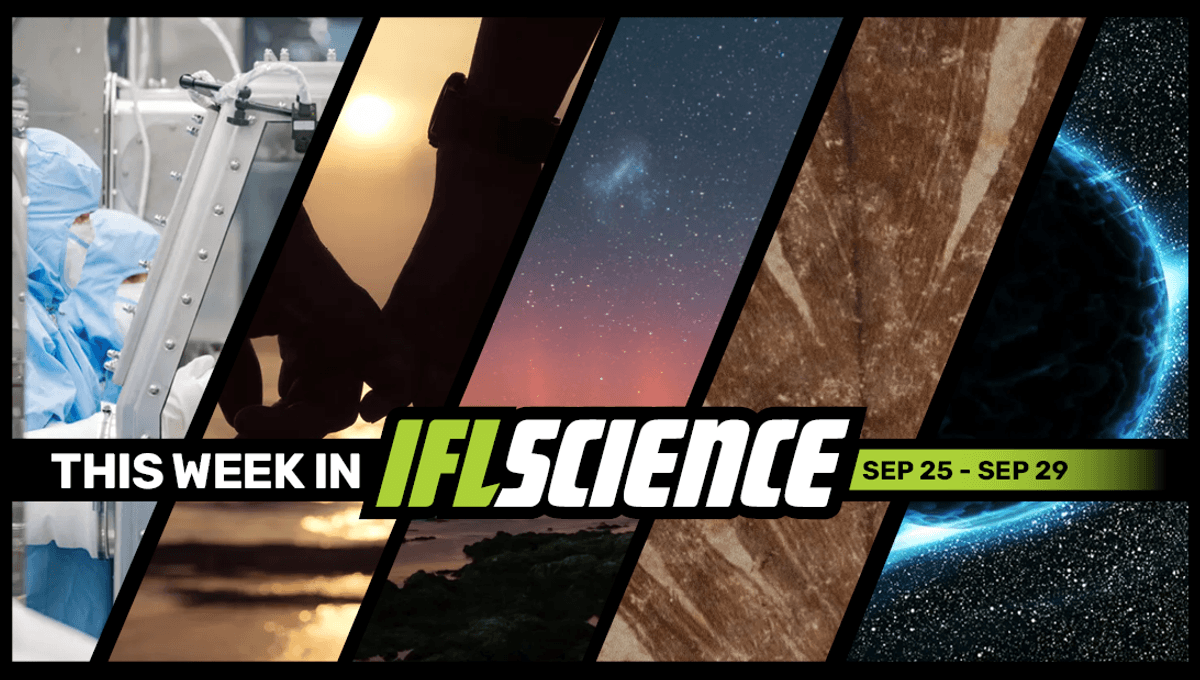
This week we turn to science for the answer to how long couples should wait before getting intimate, rare red auroras caused by the Sun ripping holes in Earth’s magnetic field, and the zoo hypothesis attempts to explain why aliens haven’t made contact. Finally, we speak to wildlife filmmaker Bertie Gregory about the highlights from his new show Animals Up Close.
Subscribe to the IFLScience newsletter for all the biggest science news delivered straight to your inbox every Wednesday and Saturday.
“Black Dust And Debris”: NASA Opens Lid Of Asteroid Sample Capsule
The OSIRIS-REx asteroid sample return capsule landed back on Earth on Sunday and the procedure to safely collect the sample from its belly has begun. The capsule was taken to NASA’s Johnson Space Center where its lid was opened inside a special glovebox to ensure no contamination. Inside NASA has found what it called “black dust and debris”, and they haven’t even opened the main container yet. Read the full story here
How Long Should Couples In Relationships Wait Before Getting Intimate?
You’ve been on a few dates, it’s going well, and you’re happily ensconced in that first flush of love. You think this could really go somewhere. Maybe it’s time to take it to the next level… but how can you be sure? It’s a question we all ask ourselves at the beginning of a relationship, and we can’t help but worry if we’re moving too fast or too slowly. Does science have the answers? Read the full story here
Sun Rips Hole In Earth’s Magnetic Field Sparking Rare Red Auroras
Unusually powerful disturbances in the Earth’s magnetic field have sparked some stunning red auroras this week, with the rare scarlet glow visible from locations across Europe and North America. Typically, the famous Northern Lights are made up of predominantly green hues, and while flashes or streaks of crimson are sometimes seen, sustained red skies are extremely uncommon. Here’s what causes them. Read the full story here
Dinosaur Feather Fossils Reveal Proteins Preserved For Millions Of Years
The humble feather lies at the heart of a new study, in which palaeontologists have revealed that feathered dinosaurs and modern birds are even more similar than we thought. Previous studies of fossilized dinosaur feathers have suggested that they had a different protein composition to that of modern birds. However, some researchers questioned whether the fossils used to reach this conclusion accurately reflected what the feathers were like at the time. Read the full story here
The Zoo Hypothesis: A “Psychologically Unpleasant” Idea Why Aliens Haven’t Made Contact
If you haven’t heard of the Fermi Paradox, it goes something like this: given the vastness of the universe and the probability of life evolving elsewhere, how come no alien civilization has ever gotten in touch? We have found many exoplanets in the brief time we’ve been looking. Surely there must be someone else out there who, like us, desperately wants to find others? Read the full story here
TWIS is published weekly on our Linkedin page, join us there for even more content.
Feature of the week:
“Surfing Godzillas” And Puma Reunions Among Bertie Gregory’s “Animals Up Close” Highlights
In a series set out to focus on the lives of individual animals, wildlife filmmaker, presenter, and National Geographic explorer Bertie Gregory captures never-before-seen behaviors of some of Earth’s most curious creatures. We catch up with him to get the inside scoop on the Animals Up Close highlights. Read the full story here
More content:
Check out season 3 of IFLScience’s The Big Questions Podcast, so far we’ve asked:
• How Is Climate Change Affecting Polar Bear Populations?
• Why Is Space Junk Such A Big Deal?
• Can We Save A Species On The Very Brink Of Extinction?
• How Does A Quantum Computer Work And How Will They Change The World?
• What Is Space Weather And How Does It Affect Us?
• What Is Ancient Ice Telling Us About The Future?
• Are E-Fuels The Future Of Aviation?
• How Are Glaciers Changing In A Warming World?
Have you seen our free e-magazine, CURIOUS? Issue 15 October 2023 is out now. Check it out for exclusive interviews, book excerpts, long reads, and more.
PLUS, join us for our first-ever free virtual festival of science, CURIOUS Live. Streaming online on October 21, 2023, we have a line-up of fascinating experts discussing all things Life, Death, and Creation (y’know, the small stuff) across three festival “stages”. Sign up now to find out more and secure your spot.
Source Link: NASA Opens Lid Of Asteroid Sample Capsule, Preserved Proteins Found After Millions Of Years In Dinosaur Feather, And Much More This Week